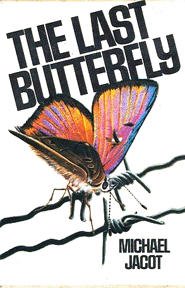Film Music at the Toronto Jewish Film Festival + Soundtrack Reviews
 Just uploaded is a quartet of reviews featuring a mix of fantasy, sci-fi, and horror titles, starting with Howard Shore’s Oscar-nominated Hugo [M] (HOWE Records), and a trio of titles from La-La Land: Trevor Howard’s The Sender [M], Basil Poledouris’ Spellbinder [M], and Danny Elfman’s music for Tim Burton’s 2001 Planet of the Apes [M] remake.
Just uploaded is a quartet of reviews featuring a mix of fantasy, sci-fi, and horror titles, starting with Howard Shore’s Oscar-nominated Hugo [M] (HOWE Records), and a trio of titles from La-La Land: Trevor Howard’s The Sender [M], Basil Poledouris’ Spellbinder [M], and Danny Elfman’s music for Tim Burton’s 2001 Planet of the Apes [M] remake.
The Sender is a pleasant surprise because it features an early thriller film score Jones wrote before he went heavily electronic a few years later, whereas Poledouris’ Spellbinder features thick electronica and several really addictive percussion tracks that have never left my mind since I saw he film on Pay TV decades ago, and awaited a soundtrack album that took almost 25 years.
Elfman’s POTA score – given a deluxe 3-disc treatment by LLL – reveals a lot of fine writing in spite of evoking the bits of wonderment and frenetic / spastic energy typical of Burton’s prior films, and a directorial style that was very ill-suited to Pierre Bouille’s original novel.
I’m not sure how many writers tried to make sense of the novel for the wonky script, but the 2001 film feels like a patchwork of Favourite Seventies Post-Apocalyptic Moments stitched together, culminating in a finale that mimics (very illogically) the twisty finale original POTA franchise writer Paul Dehn managed to mostly pull off in each of the sequels. Writers Michael Wilson and Rod Serling took separate cracks at adapting Bouille’s novel for the big screen in 1968, and that film remains not only a genre classic, but a solid monkey movie, and it just begs the question why anyone would try and remake something that’s perfectly fine?
Fox did the same with their Omen remake in 2006, but unlike the filmic mess that was Burton’s POTA, Omen was just meh – slick, glossy, fluid, a bit overlong, and emotionally dead, and did nothing to restart a franchise that was slowly ground down into a TV movie and an aborted 1995 TV series.
This is all a preamble (or maybe a teaser) for film music material being shown at the 2012 Toronto Jewish Film Festival (May 3-13) as part of their Sidebar Series The Sound of Movies: Masters of the Film Score (see full list of programmed screenings & events), of which I’m helping out in a few ways.
.
First the goodies:
Mychael Danna, Canadian & longtime composer to Atom Egoyan (Chloe), is introducing an archival 35mm print of the original POTA, so if you’ve never seen the film on the big screen with Jerry Goldsmith’s booming, experimental-styled score like myself, JUST GO. I have the Blu-ray set, but here’s another fine example as to why it’s worth catching a classic on the big screen. The impact will be bigger, Charlton Heston’s disgust at damn dirty apes will ooze from the screen, and Franklin J. Schaffner’s visual style can be relished in full 35mm glory.
The work of composer David Shire is not only being screening, but the composer will be attending and discussing specific works including Francis Ford Coppola’s sound designer’s wet dream, The Conversation, and Evening Primrose, one of Shire’s earliest gigs orchestrating Stephen Sondheim’s music for a very, very creepy teleplay, of which I reviewed both the teleplay [M] and soundtrack album [M] a few years ago.
Film critic & author Kevin Courrier will partake in a discussion with Shire for The Conversation, and Courrier will also present a screening of Something Wild – not the 1986 Jonathan Demme action/comedy, but the grim 1961 drama starring Carroll Baker and Ralph Meeker. Writer/director Jack Garfein only made 2 films – the other is the cult Ben Gazzara drama The Strange One (1957) – and SW features a rare jazzy score by Aaron Copland.
Courrier will also mount a 75 min. FREE talk of Notes and Frames: The Neglected Art of Film Music – a title inspired by Roy Pendergast’s classic 1977 book where the latter addressed an art form that’s still marginalized by snooty people and narrow-minded professionals.
And in a first for myself, I’ll be introducing a FREE screening of Fred Karlin’s documentary Film Music Masters: Jerry Goldsmith, a 1995 doc that was supposed to be the first in an unrealized series of film composer docs. Karlin was a composer in his own right – his best-known work is Westworld, with that memorable gunslinger theme – and the doc originally appeared on VHS, then on DVD (produced by my old Music from the Movies editor Paul Place), after which it vanished. Both home video versions were limited, and featured clips and music that were rights nightmares – part of the reason the doc, according to Place, will likely never be out on DVD again. This screening is a rare treat to see one of the few feature-length docs on perhaps the greatest film composer of contemporary films. Wanna know more? Read my review from 2005.
Curator Ellie Skrow has also assembled a great programme centered on Elmer Bernstein, which I’m also introducing. The set includes American Musical Theatre: Elmer Bernstein, a rare live TV appearance from 1961 that I’ve never seen before, in which Bernstein (The Magnificent Seven, To Kill a Mockingbird) essentially talks craft with students using members of the CBS Symphony Orchestra. Also included are two of the many short films Bernstein scored for Charles and Ray Eames: “House: After Five Years of Living” (1955) and “Top” (1969).
Other composer docs include Michael Nyman in Progress + Howard Shore in the featurette “A Composer’s Dream”; and the remaining FREE screenings include the 1993 doc Movie Music Man: A Portrait of Lalo Schifrin; and two installments in the 4-part Music for the Movies series: Bernard Herrmann, which I reviewed for Music for the Movies in 2007, and is presented with an excerpted interview with Danny Elfman and Tim Burton; and The Hollywood Sound, which I also reviewed in 2007, and is presented with excerpted TVOntario interviews with David Newman and Thomas Newman. Note: students can get in free 5 minutes prior to any film in the festival, subject to availability.
 Lastly – but not least in any manner – there’s a rare screening of Steven North’s production of The Last Butterfly (1990), adapted from the best-selling novel by Canadian Michael Jacot.
Lastly – but not least in any manner – there’s a rare screening of Steven North’s production of The Last Butterfly (1990), adapted from the best-selling novel by Canadian Michael Jacot.
Jacot was my screenwriting professor in university more than 20 years ago, and his novel about the horrors at the Czech concentration camp in Terezin was translated into many languages. There had been several attempts to bring to the big screen but North persevered until 1989, with Karel Kachnya directing star Tom Courtenay and major Czech actors.
Midway through filming, the Czech “Velvet Revolution” happened, and before the film had finished filming, the Communist regime was out, and soon replaced by Vaclav Havel. At the same time, a separate film crew was making a behind-the-scenes doc about the film and the political changes for Granada TV, and they managed to capture key moments as students and professors convinced their countrymen to partake in mass protests, without losing any lives. Titled The Gingerbread Revolution, David Boulton’s documentary won an Emmy, after which it vanished… until now.
Monday May 7th is a rare chance to see a 35mm screening not only of The Last Butterfly and Boulton’s documentary, but enjoy an intro from producer North, who will join me in a conversation about his father, Alex North, better known as the composer of Spartacus, and author of “Unchained Melody” – the love theme which became a huge hit in the fifties, and again in 1990 when it was used extensively in the romantic film Ghost. Butterfly was Alex North’s last film score, and this screening is perhaps both a fitting tribute to a brilliant composer, gifted author Jacot, and a more official North American film premiere, given the film disappeared soon after its theatrcal release in 1990.
Also shown that evening is another rarity: a 1986 NBC Today Show interview with North talking very humbly about his art. It’s perhaps the one time the composer was captured in a Q&A on tape, and thanks to NBC producer Ric Romo, the footage was saved from the dumpster, and edited into a longer interview segment that’s a treat for North fans.
I’ll post related material and reviews to the TJFF Sidebar Series over the coming weeks, including an audio interview with Michael Jacot I conducted shortly after I graduated from film school. He discusses the genesis of his book, efforts to make the film during the early seventies, and thoughts on Alex North, and it’s been sitting in a box for 20 years (almost to the day)… until now.
Check out the TJFF catalogue – there’s a lot of diverse material worth skipping work over.
.
.
Mark R. Hasan, Editor
KQEK.com ( Main Site / Mobile Site )
Category: EDITOR'S BLOG, FILM MUSIC, FILM REVIEWS





Connect
Connect with us on the following social media platforms.